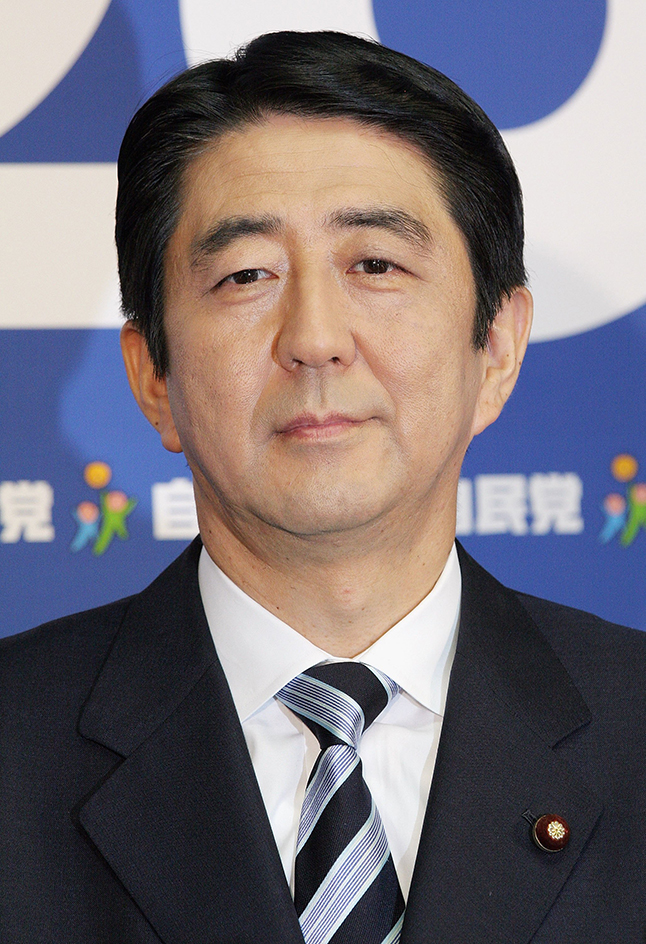Abe << AH bay >>, Shinzo (1954-2022), served as prime minister of Japan from September 2006 to September 2007, and again from December 2012 to September 2020. Abe brought increased political stability to Japan after a period of rapid turnover in the office of prime minister. He became Japan’s longest serving prime minister. Abe was a member of Japan’s conservative Liberal Democratic Party (LDP).

Abe was born on Sept. 21, 1954, in Tokyo. Like many leading conservative Japanese politicians of his generation, Abe was a member of a politically prominent family. His grandfather, Nobusuke Kishi, was prime minister from 1957 to 1960. Abe’s father, Shintaro Abe, was a prominent LDP faction leader in the 1980’s and 1990’s. Shinzo Abe graduated from the School of Law at Seikei University in Tokyo in 1977.
After graduating, Abe worked for a steel company for several years. In 1982, he left the company to serve in a series of staff assistant positions under prominent LDP politicians. Shintaro Abe died in 1991. In 1993, Shinzo Abe was elected to Japan’s legislature, the Diet. Japan is divided into political units called prefectures. Like his father, Shinzo Abe represented his home prefecture, Yamaguchi, in the southwestern part of the island of Honshu.
Abe was then appointed to a number of prominent party and government positions. He gained prominence in 2002, when he served as chief negotiator in talks with North Korea that led to the return of a number of Japanese citizens who had been kidnapped by North Korean agents in the 1970’s and 1980’s. In the early 2000’s, Abe took strongly nationalist positions that he outlined in his book Toward a Beautiful Country (2006).
Abe first became LDP party president and Japan’s prime minister in September 2006, after Prime Minister Junichiro Koizumi stepped down. Abe’s first term was plagued by a series of scandals, and popular support for both Abe and the LDP dropped. After parliamentary elections held in July 2007, the LDP lost control of the upper house of Japan’s parliament. In the face of mounting criticism, Abe resigned as prime minister and LDP head.
In September 2012, Abe was again elected to lead the LDP. In December, the LDP gained a solid parliamentary majority following lower house elections, and Abe again became prime minister. Shortly afterward, Abe introduced a program of economic reform that came to be known as “Abenomics.” Japan’s economy had struggled with deflation (declining prices of goods and services) since the early 1990’s, and economic growth was sluggish. The program aimed to stimulate the economy by increasing the amount of money in circulation and by boosting government spending, particularly on such infrastructure projects as building schools and repairing roads. In addition, the Japanese government negotiated new international trade and investment agreements.
In 2014, Japan held early parliamentary elections to secure a mandate to continue the Abenomics program. The LDP retained its majority in the upper house, and Abe remained in office as prime minister. In September 2015, the LDP reelected Abe as head of the party. Later that month, Japan’s government passed controversial legislation supported by Abe. The legislation reinterpreted the country’s Constitution to allow Japan’s defense forces to serve overseas in aid of its allies. In 2016 elections, the LDP and its allies won a majority of seats in the upper house of the legislature. This gave them a majority in both houses.
In 2017, Japan faced increasing threats of an attack by North Korea. Abe called for snap parliamentary elections, hoping to solidify support for his efforts to strengthen Japan’s military. The LDP won the elections, and Abe remained prime minister. Abe was reelected as president of the LDP in 2018. In elections for the upper house of the parliament in 2019, the LDP retained its majority.
In August 2020, Abe announced his resignation as party leader for reasons of ill health. He remained prime minister until mid-September, when the LDP elected Yoshihide Suga, the chief cabinet secretary, as its new leader. Abe formally resigned as prime minister on September 16, and the parliament elected Suga prime minister
Abe died on July 8, 2022, after he was fatally shot while giving a speech in the city of Nara in southern Japan. The alleged shooter was immediately captured. Abe had been in Nara to campaign on behalf of an LDP candidate running in upcoming elections for the upper house of the Japanese Diet. In September, Abe was honored with a state funeral.
